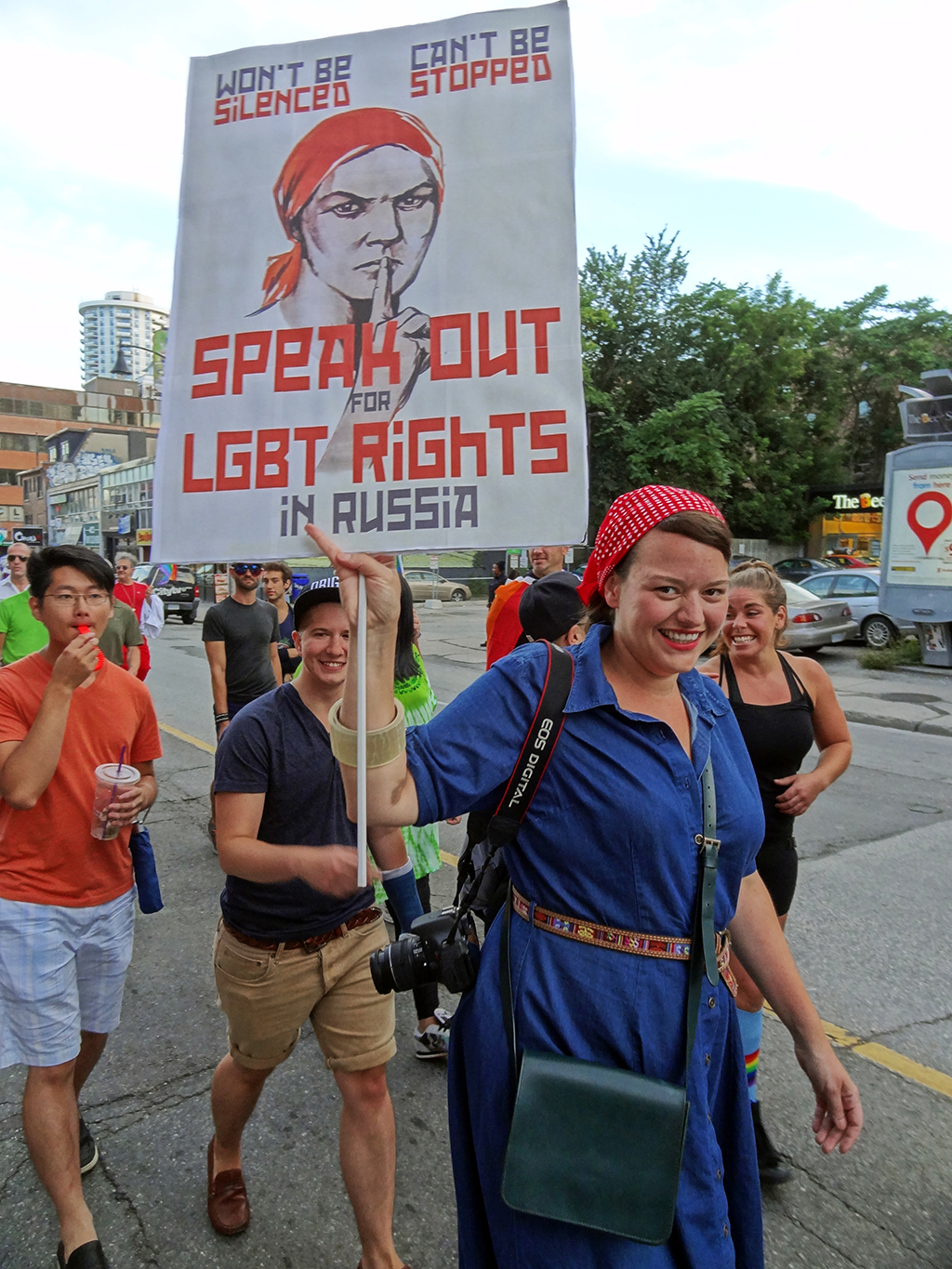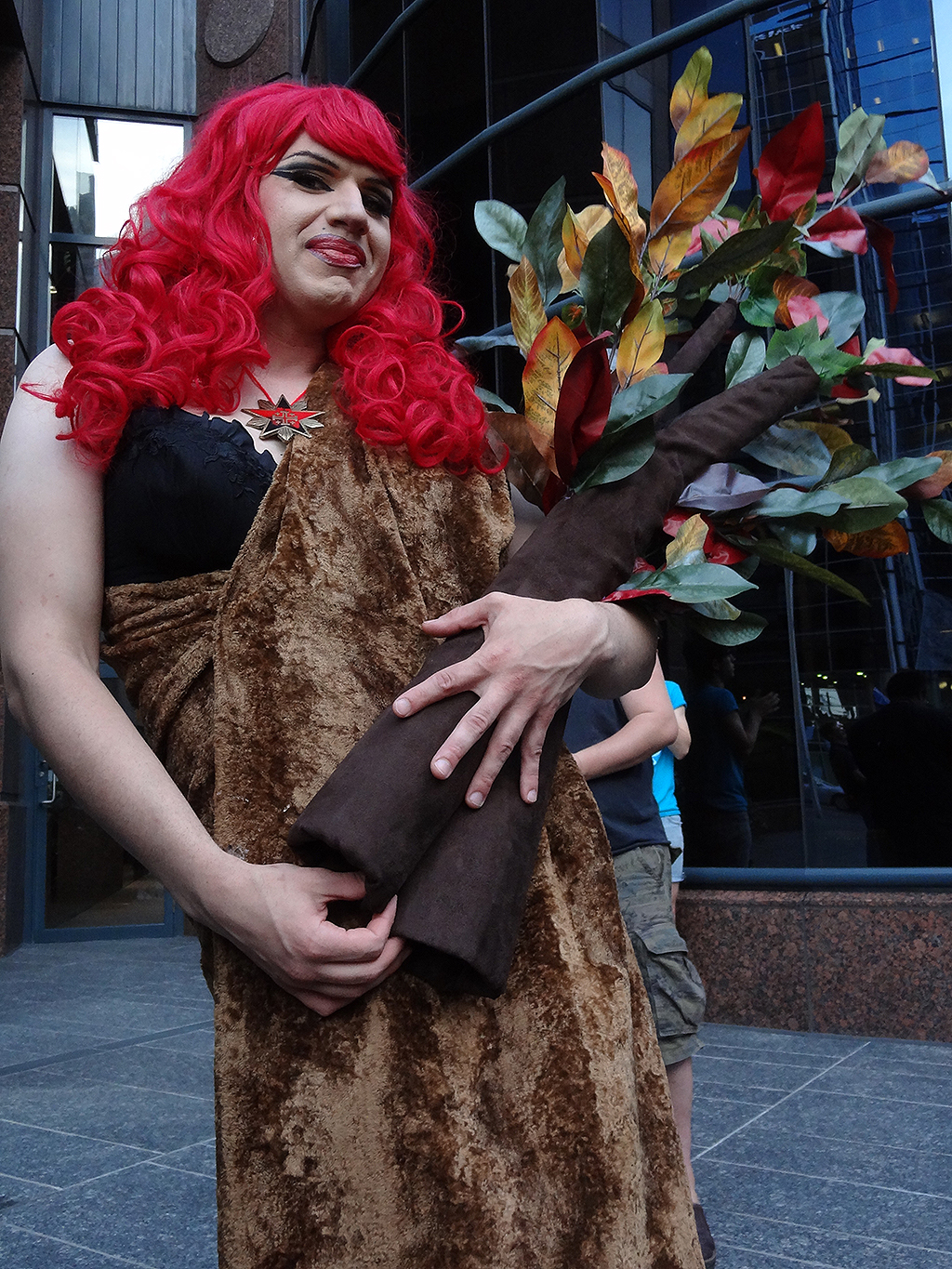You can change the conversation. Chip in to rabble’s donation drive today!
I am angry about what has been happening in Russia and now because of what has been happening in Toronto with our mayor. I want to write something about fear. I know the LGBT people in Russia feel it, but didn’t understand until now how I could feel it too. I know the stakes are different yet it’s all part of the same continuum. I needed to deal with this by writing something so that I would not be frustrated and be able to talk about this fear with you. I admire so many of you for speaking up publicly, posting your thoughts through social media and attending and planning actions. I know many of you share my anger and knowing that helps us all not be so afraid.
I am 6′ 1″ and a pretty big guy. I’ve been in some places and situations that could be considered dangerous. That was when I was younger. They say that there is an actual chemical in our brains that makes you fearless when you’re young; when you’re older it diminishes and you start to take less risks, become more afraid.
I want to talk about fear. To admit to be afraid of something is often seen as a sign that you’re weak, cowardly, helpless or overly dependent. So now I think it’s a good time to admit I am afraid but I don’t feel weak and helpless. At the same time, I want to articulate how the events of the last few days have led up to this realization: me being afraid. I want to articulate how important it is to address the hate that threatens the lives of so many queer people across the globe and even here in Toronto.
Homophobia is a strange word. It focuses on the fear that the abuser has for the person that he or she is abusing. It’s their problem and if they weren’t afraid of us, we’d be totally free to live as we please. And many LGBTQ people believe that we would live the same way that they do — have relationships, jobs, raise kids. But focusing on someone else’s fear of you does not focus and acknowledge on the legitimate fear you might have of the homophobes and how the trauma you are experiencing because of their hate can immobilize. Rob Ford’s actions and words have given me an opportunity to examine my fear.
Racism and misogyny are evident in our culture. So, for example, when a woman hears about a rape or domestic violence or a person of colour hears about a shooting or police violence against their community, they feel it viscerally. And they hear it again and again. They live it day in and day out. I can’t speak of their experiences with authority and don’t plan to here. I just want to say that racism and misogyny are woven into our cultures. I see and hear it, but can only understand it from my position — and I hope that I try my best to challenge the oppression of people who aren’t necessarily what I identify as. Unlike racism and misogyny, homophobia is less explained as part of a system of oppression and more as a personal problem that someone has to deal with. Fix the person, fix the problem. It’s not so easy.

So when Rob Ford ordered the removal of the rainbow flag that was raised in solidarity with the LGBTQ people who are suffering under Putin’s regime, I was angry and I also realized that I was afraid. I heard our mayor justify a hate that is in part motivating actions against LGBTQ people elsewhere. How is that even possible? His words and actions give license to people to dismiss, humiliate or be violent toward LGBTQ people simply because they are queer and open about being queer.
Maybe I would have stayed angry and not been aware of my fear if Ford hadn’t admitted that it wasn’t the family cottage outing that kept him from attending the Pride Parade. No, he was missing Pride because he never went to it before and he wasn’t going to change the way he is. He never elaborated on what “the way he is” actually was, but then he ordered the flag removed. That shed some light on his character and beliefs (and his strategies to win the next election). He has promised to change when it comes to his addictions and lifestyle, but when it comes to his hate for the gay, lesbian, bisexual and trans community, he’s not going to budge. He was born this way we’d have to assume.
I see postings on the “I Hate the War on Mayor Rob Ford” Facebook page. They are full of bile and ignorance. The people that support Ford have no problem calling anyone who doesn’t support him a litany of foul and disgusting names. And now those people have a hero who can speak for them about the LGBTQ community. How can they support Ford knowing he’s done this and said these things? I don’t know how they can look their LGBT family members, co-workers and neighbours in the face and still believe Ford’s hate speaks for them. Is the bar so low that all it takes is a false belief that he’s saving them money? Everything else is excusable? Or do they believe that Ford speaks for them on both accounts — he has “stopped the gravy train” and is hateful to the LGBTQ community?
So what do I want from people around to help me deal with this fear? First off, I want them to listen. Just like women and people of colour don’t have to be told that you’re not racist or misogynist, I and other LGBTQ people don’t need to hear about how you personally aren’t homophobic (I am using the term here as much as I am conflicted about it). People know what you are by your actions. The term “Ally” has already been exposed as a weasel word because it means nothing if you don’t act. So listen to queers talk about their fears and what Ford has caused for them. And queers talk to other queers about this same thing. It can be exhausting pretending that everything is all right and Ford has proven that it isn’t. If it does indeed get better, ask how that can happen.
Secondly and related to the point about taking action, act. Straight people are in the privileged position to help affect the change by challenging homophobia with their families, friends, neighbours and co-workers. Talk about Russia; talk about Ford; post how angry you are; go to rallies and make your position known not only by saying how you feel, but by putting your body beside queers who are in the streets and meeting rooms planning what to do next. And there might be queer folk you know who are not connected to a larger community — call or meet with them, listen to them and tell them how you feel. Their isolation could be killing them.
I am sure there are straight people who are speaking out; it warms my heart that I know many and see posts by them and others. But I don’t want to hear individual testimonials; I want to see a movement made up of straights and LGBT people demanding justice and demanding that Ford’s actions have repercussions.
We may think we live in a safe world, far from the horrors outside as Putin puts his boot on the backs of the LGBTQ people in Russia; as laws in Nigeria, Uganda, Cameroon and other African states deny humanity to their LGBT people; as in the Caribbean, as in India; as in Greece, as in Romania; as in the Middle East … the list is long. But the truth is an elected official, the chief magistrate of Toronto has stirred a fear in our hearts that makes us afraid of what could happen to us because of who we are. We should never have had to deal with this in 2014 because so many have fought and died to ensure that we have our rights and continue to realize our full rights. But they can be taken away and if people don’t step up and face Ford’s hate, we’ll see things happen that we can’t imagine.
Like this article? Chip in to keep stories like these coming!
Roy MItchell is an arts administrator, videomaker and writer. He is the host of the weekly Internet radio show ROYNATION. He lives in Toronto and is planning on relocating to his farm in the ghost town of Hybla, Ontario once the snow melts.
Photos courtesy of Elizabeth Littlejohn



